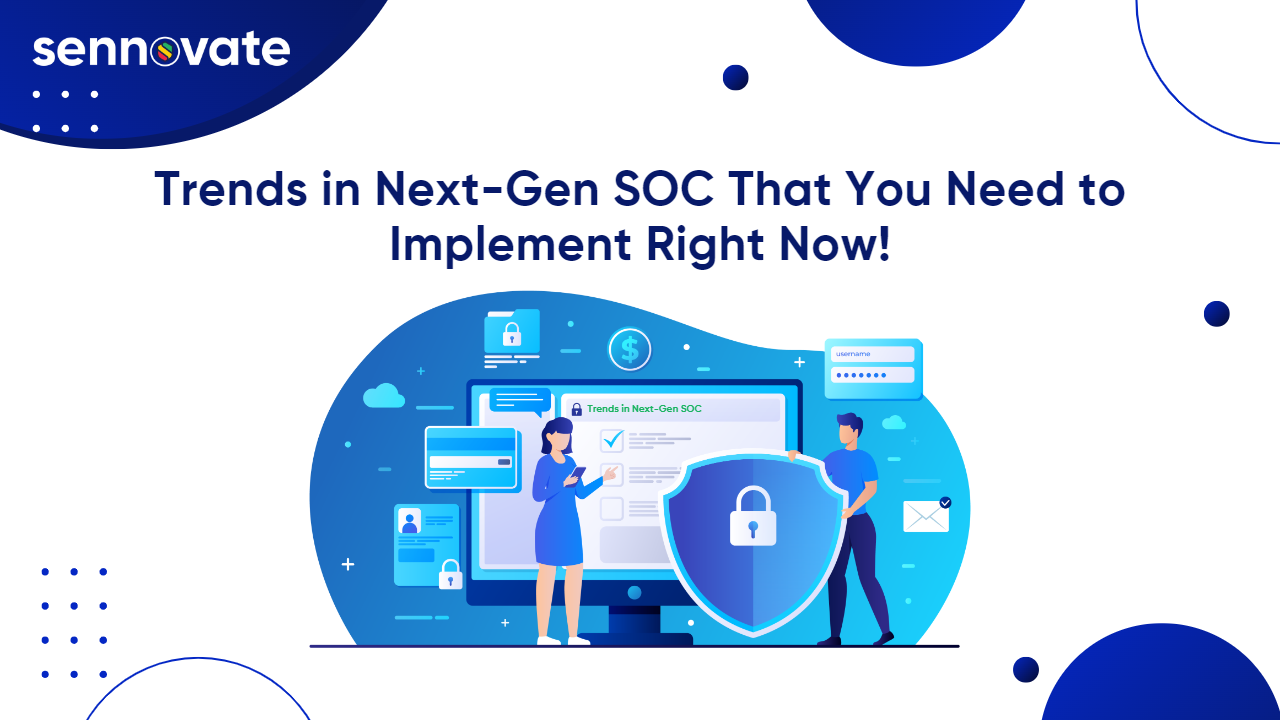

Trends in Next-Gen SOC That You Need to Implement Right Now!
You can now automate deployment of ForgeRock AM on AWS with Sennovate+Try now
The organisations detect, monitor, and respond to cyber-threats with the help of a security operations center (SOC). Various services, including log monitoring and analysis, vulnerability management, incident response, and, increasingly, proactive threat hunting, are provided by the Next-Gen SOC.
In recent years, the requirements for SOCs have evolved greatly as attack volumes have increased and threats have grown more sophisticated. Most organisations are struggling with a deepening skills crisis as they have had to manage new risks from cloud adoption and digital transformation initiatives. Next-Gen SOC will help with this.
You must be wondering what Next-Gen SOC is. What are the new trends? How to implement it? This blog is about the Next Generation SOC and its trends.
Let’s proceed!
What Is a Next-Gen SOC?
A next-generation SOC is where information systems in the data center, endpoint, and cloud are monitored, assessed, and defended against cyber attacks following a methodology that utilizes security enforcement points and threat research tools that integrate natively rather than relying on security point products that do not natively interoperate.
Interested in testing IAM solutions? Join our beta program and receive rewards for your feedback
Next-Gen SOC Trends
Adopting All-In On The Cloud
All organizations should go all-in on the cloud, whether it’s migrating previous on-prem assets into the cloud or building a company with a cloud-first strategy. It is expected that this year the spending on public cloud services is $494.7 billion in total. This is a 20.4% increase from last year, and to some capacity, 90% of organizations are already using cloud services.
It is obvious that cloud usage will only grow, which means it is important to have tools and strategies to scale with it. To leverage cloud services, SOC teams have to contend with the cloud as organizations continue to scale with the cloud.
Adopt Automation
Enterprises have seen a 125% increase in incidents from year to year. This justifies that cyberattacks will only increase in sophistication and frequency. The variety and quantity of attacks require best-in-breed tooling that can cover a breadth of technology, yet many of these tools typically lack the organizational context required to produce meaningful alerts.
The SOC team has to improve its cyber attack response by adopting automation that can help avoid becoming overwhelmed by alerts and increase the speed of response.
Open Architectures and Layered Analytics
To improve operational and security efficiencies and to integrate data from multiple security tools, SOCs will require a next-generation SIEM or a common security analytics and operations platform architecture (SOAPA). SOCs will need an open architecture and layered SIEM, user and entity behavior analytics (UEBA), and SOAR capabilities.
To be effective, next-gen SIEM platforms will require a unified interface, or mission control, that will bring together data from layered analytics tools, so analysts won’t have to toggle from one interface to another to see what the logs or the network are telling them.
Machine Learning Boosts Threat Hunting and Investigations
Machine-learning (ML) tools are the key to effective threat detection and response as data volumes and security alerts increase.
To boost investigation and to improve the capability to detect and respond to threats, most of the forward-leaning Next-Gen SOCs have already begun using ML-based tools. ESG’s survey showed that more than half (52%) are already extensively using ML or using it on a somewhat more limited basis. Twenty percent are piloting ML projects, while another 18% are planning to deploy or are interested in deploying ML for threat detection and response.
Wrapping Up
Are you in doubt that the cost of running the SOC is increasing, questioning whether it will boost security protection or not? Ask the Sennovate’s experts regarding the Next-gen SOC and it can be automated to increase its effectiveness. Building a next-generation SOC for your organization takes automation and cyber protection to the next level. Then you will realize that every money you spent on SOC will be worth it for your organization.
Summing up on how to create a next-generation SOC:
1. Automate the day-to-day, repetitive tasks of neutralizing low-level threats.
2. Integrate data from prevention systems such as firewalls as well as end-point protection software to give the SOC an overview of threat data.
3. In the SOC playbook, automate the easy steps.
4. Free up security analysts to focus on the vital tasks of hunting threats and dealing with targeted attacks with the help of automation.
Having any doubts or want to have a call with us to know more about IAM solutions for your organization?
Contact us right now by clicking here, Sennovate’s Experts will explain everything on call in detail.
You can also write a mail to us at [email protected] or call us on +1 (925) 918-6565.
About Sennovate
Sennovate delivers custom identity and access management (IAM) and managed security operations center (SOC) solutions to businesses around the world. With global partners and a library of 2000+ integrations, 10M+ identities managed, we implement world-class cyber security solutions that save your company time and money. We offer a seamless experience with integration across all cloud applications, and a single price for product, implementation, and support. Have questions? The consultation is always free. Email [email protected] or call us at: +1 (925) 918-6565.




